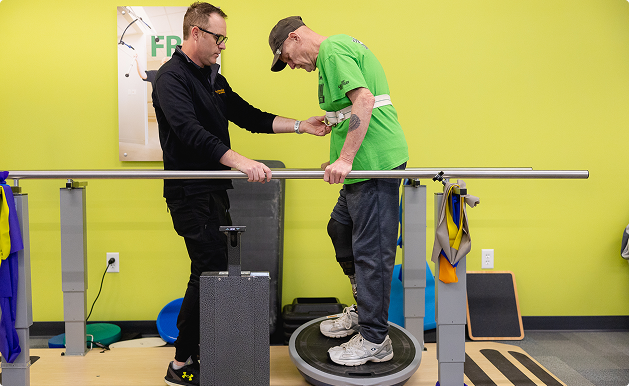Balance and Fall Prevention
Understanding the Risk
One in five falls leads to an injury such as a broken bone.
Our program assists patients at risk of falling for various reasons, including:
Deconditioned State
Orthopedic Trauma or Surgery (e.g., Hip Fracture, Knee Replacement)
Parkinson’s Disease
Visual Impairment (e.g., Macular Degeneration, Glaucoma)
We also help individuals who have experienced unexplained falls, have a fear of falling, have a history of disabilities (such as brain injury, stroke, or spinal cord injury), or have recently suffered a fall.
Expert Balance and Fall Prevention Services
Our primary goal is to ensure your safety and help you maintain an independent lifestyle. Early intervention and continuous therapy are crucial to reducing the risk of falls and improving overall quality of life.

Your treatment begins with a comprehensive evaluation of your medical and social history and a thorough examination of your risk factors, which may include:
Balance Sssessment
Vision Assessment
Musculoskeletal Functional Mobility Evaluation
Coordination Assessment
Identification of Other Circumstances Impacting Your Safety
Discover if Balance and Fall Prevention Therapy Is Right for You


Personalized Treatment Plans
Our team of therapists will develop an individualized treatment plan to meet your goals and reduce your fall risk. Depending on your needs, your treatment may include:
- Balance and Coordination Therapy
- Balance and Stability Training
- Range-of-Motion Exercises
- Strength Exercises
- Activities of Daily Living
Risk Factors
- Deconditioned state
- Orthopedic trauma or surgery
- Osteoporosis
- Parkinson’s disease
- Visual impairment


How to Reduce your Risk of Falling
- Improve your physical conditioning
- Ensure proper vision correction
- Address environmental hazards in the home
- Manage medications that affect balance
- Participate in regular balance and strength training exercises







